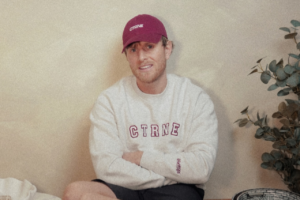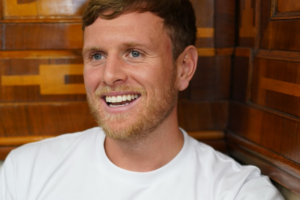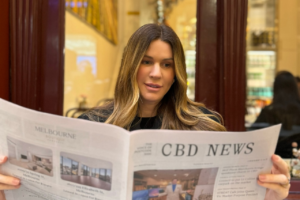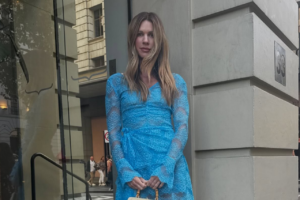In the landscape of British entrepreneurship, few trajectories capture the imagination quite like Tommy Mallet’s metamorphosis from reality television fixture to fashion industry innovator. His story begins not in the polished corridors of business schools or the inherited wealth of family enterprises, but in the waiting rooms of “The Only Way Is Essex,” where he would sketch sneaker designs between scenes, armed with nothing but a pencil and an unshakeable vision.
What sets Mallet’s narrative apart isn’t merely the ascent from television personality to business mogul—it’s the raw authenticity with which he approached his transformation. In an industry often characterized by carefully curated personas, Mallet built his empire while grappling with undiagnosed ADHD and dyslexia until age 30, challenges that would have deterred many but seemed to fuel his entrepreneurial drive. “I always knew I was going to be someone,” he reflects, a statement that carries both the weight of determination and the vulnerability of self-discovery.
The numbers tell one story: a £25 million sneaker empire, distribution in 150 stores worldwide, and the kind of explosive growth that turns heads in boardrooms. But beneath these impressive figures lies a more nuanced narrative—one of a man who found himself navigating the complexities of massive success while struggling to read business contracts, who built a global brand while learning to understand his own mind, and who ultimately chose to walk away from it all to rebuild with newfound purpose.
Now, as Mallet launches Citrine, the world’s first crystal-infused sneaker brand, he brings with him not just the lessons of his past success but a transformed perspective on what truly matters. “I’ve lost it all and I’ve gone through the maddest year and I’ve enjoyed every single moment of it,” he shares, exemplifying a philosophy that challenges conventional notions of success and failure in the business world.
This is not merely a story of rags to riches, nor is it a cautionary tale of fame’s pitfalls. Instead, it’s a masterclass in resilience, authenticity, and the courage to redefine success on one’s own terms. As Mallet steps into this new chapter, he offers a compelling blueprint for modern entrepreneurship—one that values personal growth and family bonds as much as profit margins and market share.
In the competitive landscape of luxury footwear, where heritage brands often reign supreme and newcomers struggle to gain footing, Tommy Mallet’s ascent stands as a testament to the power of unconventional beginnings. The story of Mallet Footwear’s rise isn’t merely about numbers—though the figures are undeniably impressive—it’s about reimagining what’s possible when raw ambition meets strategic vision.
In the waiting rooms of “The Only Way Is Essex,” while other cast members scrolled through social media or rehearsed lines, Mallet could be found sketching sneaker designs with singular focus. These moments between scenes, which might have seemed inconsequential to observers, were laying the foundation for what would become a global fashion empire. “I’d have a pad with a pencil, and I’d be sitting there drawing shoes all day,” Mallet recalls, painting a picture of dedication that transcended his reality TV persona.

The brand’s trajectory took a decisive turn in Liverpool, a city known for its discerning fashion sense and trend-setting consumers. “If you can make it in Liverpool,” Mallet notes, “the whole of Liverpool will support you.” This proved prophetic when a single shoe release during the Christmas season catalyzed the brand’s expansion. The success wasn’t just about the product; it was about understanding market psychology and regional dynamics—a lesson in the importance of strategic market entry points.
What followed was a masterclass in scaling with intention. Mallet Footwear’s expansion into 150 stores worldwide wasn’t achieved through aggressive marketing alone, but through a careful balance of product innovation and market responsiveness. The brand reached £25 million in sales, a figure that becomes more remarkable considering Mallet’s admission of being unable to read contracts during the company’s early days due to undiagnosed ADHD and dyslexia.
Perhaps most telling is how Mallet approached distribution partnerships. Rather than pursuing every available retail opportunity, the brand maintained selective partnerships that aligned with its vision for luxury streetwear. This strategy helped position Mallet Footwear in the sweet spot between accessibility and exclusivity—a delicate balance that many emerging brands struggle to achieve.
The evolution from sketch pad to global brand wasn’t without its challenges. Mallet faced skepticism from industry veterans who questioned whether a reality TV star could create a legitimate luxury footwear brand. Yet it was precisely this outsider perspective that allowed him to disrupt traditional industry norms. “I didn’t want to put my fate in anyone else’s hands,” he explains, highlighting a philosophy that would guide his approach to business growth.
In the end, Mallet Footwear’s rise represents more than just commercial success—it’s a blueprint for modern brand building that challenges conventional wisdom about what’s required to succeed in luxury fashion. The journey from TOWIE to international fashion brand demonstrates that in today’s market, authenticity and vision can trump traditional industry credentials, and that sometimes the most unlikely beginnings can lead to the most remarkable destinations.
In the glossy world of entrepreneurial success stories, vulnerability rarely takes center stage. Yet Tommy Mallet’s journey with ADHD and dyslexia offers a compelling counternarrative to the polished façade of business achievement. His story illuminates how neurodivergence, often viewed as a liability in traditional business settings, can become an unexpected catalyst for innovation and authentic leadership.
Until age 30, Mallet navigated the complex waters of building a global brand while harboring an undiagnosed secret: he couldn’t read or write effectively. “I couldn’t read them right until I was 30,” he reveals about business contracts, a confession that adds layers of complexity to his £25 million success story. In an industry where detailed documentation and careful analysis are considered fundamental, Mallet’s experience challenges conventional wisdom about what constitutes necessary skills for business success.
The impact of his late ADHD diagnosis extends beyond personal revelation—it fundamentally shaped his approach to business leadership. “When I don’t know my times tables that well,” he admits, “but if something’s going on with money and there’s an equation or a percentage, I’ll be like bang, and I’ll tell you.” This seemingly paradoxical combination of specific strengths and challenges exemplifies how neurodivergent thinking can offer unique advantages in entrepreneurship.
Perhaps most remarkable is Mallet’s transformation of his struggles into a platform for authentic connection. Rather than concealing his challenges, he chose to share them openly, recognizing that vulnerability could be a powerful tool for brand building. “I’ve saved thousands of people from being in their own head,” he reflects, highlighting how personal transparency can transcend business strategy to create meaningful social impact.

The decision to disclose his ADHD diagnosis came with its own set of challenges. “It got used against me,” he acknowledges, “but at the same time, it also made people want me even more.” This duality—where vulnerability becomes both a potential liability and a source of strength—offers valuable insights for modern business leaders grappling with authentic leadership in an age of carefully curated public personas.
Mallet’s approach to managing his ADHD in business settings provides a masterclass in adaptation. Rather than attempting to conform to traditional business practices, he developed systems that worked with, rather than against, his natural tendencies. This included surrounding himself with team members who could complement his strengths and support his challenges, creating an environment where both he and his business could thrive.
His story serves as a powerful reminder that success in business isn’t about fitting into predetermined molds, but about understanding and leveraging one’s unique attributes—even those that might initially appear as limitations. “I can do things that not a lot of people can do,” he notes, “and that’s because of the ADHD.” This reframing of neurodivergence as a potential advantage rather than a hindrance offers an important perspective for business leaders and entrepreneurs who might be struggling with similar challenges.
In an era where mental health and neurodiversity are increasingly part of public discourse, Mallet’s journey provides a blueprint for how personal challenges can become the foundation for both business success and meaningful social impact. His experience suggests that true innovation often comes not from conforming to established norms, but from embracing and leveraging one’s unique perspective and challenges.
In the high-stakes world of luxury fashion, where success is often measured in profit margins and market share, Tommy Mallet’s decision to step away from his £25 million empire challenges conventional narratives about entrepreneurial success. Through the lens of personal loss and profound reflection, his story illuminates a deeper truth about the intersection of business ambition and human connection.
The catalyst for this transformation came in the form of devastating personal loss. When Mallet and his partner Georgia experienced a miscarriage in 2022, the glossy veneer of business success began to crack. “When you go through loss and went through a miscarriage of Georgia and I see how bad it had affected her, and I looked around and see my world breaking apart,” he recalls, his words cutting through the typical bravado of entrepreneurial discourse to reveal a raw humanity rarely glimpsed in business profiles.
This moment of crisis forced a profound reevaluation of priorities. The realization that his single-minded focus on business growth had come at a cost became impossible to ignore. “I’d lost everything,” Mallet reflects, not referring to financial losses but to the intangible wealth of personal connections and family bonds. “I didn’t really have any friends, had a few friends, didn’t have any relationships with anyone. I just had this company that I’d built.”
The decision to step back from Mallet Footwear wasn’t made in a moment of weakness but rather from a position of newfound clarity. In a culture that often celebrates the “hustle at all costs” mentality, Mallet’s choice to prioritize family over empire-building offers a compelling alternative narrative. His approach to work-life balance evolved from theoretical to practical, manifesting in simple but significant ways: being present for school pickups, engaging fully in family moments, and learning to “switch off” when at home.

Perhaps most striking is Mallet’s revelation about the true nature of wealth. “Yes, I had Ferraris, yes, I had millions of pounds, I had loads of houses, but my missus had just lost a baby that we was about to welcome in,” he shares, highlighting the stark contrast between material success and emotional fulfillment. This perspective challenges the traditional entrepreneurial narrative that often positions business success and personal life as competing interests rather than complementary aspects of a well-lived life.
The evolution of his work-life philosophy hasn’t meant abandoning ambition but rather reframing it within a more holistic context. Today, as he launches his new venture, Citrine, Mallet approaches business with a transformed perspective. Success is no longer measured solely by financial metrics but by the ability to maintain presence and connection with family while pursuing professional goals. “When I get home, I’m actually very quiet,” he notes, describing his learned ability to separate business intensity from family time.
In sharing this journey, Mallet offers a powerful template for modern entrepreneurship—one that acknowledges the full spectrum of human experience and refuses to sacrifice personal connections at the altar of professional success. His story suggests that true business innovation might lie not just in product development or market strategy, but in reimagining the relationship between professional ambition and personal fulfillment.
In the ever-evolving landscape of luxury fashion, where innovation often manifests in subtle iterations of existing designs, Tommy Mallet’s Citrine brand emerges as a bold departure from convention. The world’s first crystal-infused sneaker line represents more than a mere product launch—it’s a testament to the transformative power of adversity and the unexpected confluence of spirituality and style.
The genesis of Citrine arose from Mallet’s personal journey through turbulence. After stepping away from his successful Mallet Footwear brand and navigating complex legal battles, he found himself drawn to the stabilizing energy of crystals, particularly citrine—a stone traditionally associated with prosperity, creativity, and positive energy. “When I started searching,” he explains, “the crystal brings wealth, abundance, prosperity, creativity, stops you from thinking bad things.” This personal connection to the stone’s properties would become the cornerstone of a revolutionary concept in footwear design.
What distinguishes Citrine from typical fashion ventures is its ambitious fusion of material innovation with spiritual wellness. Each sneaker incorporates actual citrine crystal, sourced from mines in Brazil, creating a product that transcends pure aesthetics to embrace a deeper purpose. “Whether you say it’s actually scientifically proven or it’s a placebo effect,” Mallet notes, “if I tell you that you’ve got a crystal in the bottom of your shoe and every time you put it on and you look at it that’s going to make you have a good day, you got more chance of having a good day than you have without it.”
The brand’s development hasn’t been without its challenges. An injunction initially restricted Mallet from approaching certain retailers until October 31st, forcing a strategic pivot in distribution and marketing. Yet these limitations, rather than hindering progress, have seemingly crystallized the brand’s identity and purpose. Mallet’s response to these restrictions reflects a mature entrepreneurial philosophy: “When something’s destined and meant to be, it just comes and happens so easy… with Citrine everything has been flawless.”
Perhaps most striking is Citrine’s target audience—not merely fashion enthusiasts, but individuals navigating life’s transitions and seeking something beyond mere aesthetics. “Citrine for me is for anyone who is going through their 20s, going through their 30s, they go through a bit of trauma, they don’t seem like they can feel the break, but they know deep down that there’s something better destined for them,” Mallet articulates, positioning the brand at the intersection of fashion and personal transformation.
This approach to brand building—where product innovation meets spiritual wellness and social impact—represents a fascinating evolution in luxury fashion. In a market often criticized for its superficiality, Citrine’s emphasis on meaning and purpose-driven design offers a refreshing alternative. The brand’s development suggests that the future of luxury might lie not just in material quality or design innovation, but in the ability to connect with consumers on a deeper, more personal level.
As Mallet navigates this new chapter, his vision for Citrine extends beyond commercial success to creating a movement that combines style with substance, materialism with meaning. “I can see where this is going,” he shares with characteristic certainty, “and it’s that big it scares me.” In this vulnerability lies perhaps the most compelling aspect of Citrine’s story—the recognition that true innovation often emerges from the intersection of personal transformation and professional reinvention.
In the kaleidoscopic world of luxury fashion, where success stories often follow predictable trajectories, Tommy Mallet’s vision for the future defies conventional wisdom. Having experienced both the intoxicating heights of multimillion-pound success and the humbling depths of starting anew, his perspective on growth and fulfillment offers a refreshing counterpoint to traditional entrepreneurial narratives.
Mallet’s approach to manifestation transcends the often superficial interpretations prevalent in business culture. “I’ve never said nothing and not done it,” he asserts, describing a practice grounded not in wishful thinking but in unwavering action and belief. His manifestation technique involves detailed visualization—from drawing store concepts that later materialized on Carnaby Street to declaring future achievements while operating with modest resources. “I’ve probably said I’m going to go and buy these his and hers G wagons with probably four grand in the bank,” he recalls, highlighting how vision preceded reality in his journey.
Perhaps most striking is Mallet’s philosophical approach to money and success in the wake of significant financial loss. “Ferrari is a Ferrari… it don’t matter. I don’t care,” he states with remarkable equanimity, challenging conventional notions of entrepreneurial success. This isn’t the resignation of defeat but rather the wisdom of someone who has discovered that true wealth extends beyond material possessions. His experience suggests that the entrepreneurial journey’s greatest value lies not in the accumulation of assets but in the evolution of perspective.
Looking toward 2025, Mallet’s vision for Citrine is ambitious yet grounded in personal values. “By May next year, you’ll be like wow, how has someone done this so fast,” he predicts, while simultaneously emphasizing his commitment to maintaining presence in his family life. This dual focus represents a mature approach to scaling—one that recognizes growth needn’t come at the expense of personal relationships.
The foundation of his future strategy rests on what he calls the “5% every day” principle. Rather than pursuing dramatic transformations, Mallet advocates for consistent, incremental progress. “If you only build 1% a day, you’re still going to be better off than everyone else,” he explains, offering a sustainable approach to business growth that contradicts the often frenetic pace of fashion industry expansion.
Most compelling is Mallet’s evolving definition of success. Having experienced the hollow victory of achieving financial success while feeling personally unfulfilled, his new venture prioritizes meaningful impact alongside commercial viability. “I’m building and so it was like right, become the best I can be at home and then build everything from that,” he shares, articulating a philosophy that places personal growth at the foundation of professional achievement.
This integrated approach to future growth—where business ambition and personal fulfillment are seen as complementary rather than competing forces—offers a compelling blueprint for modern entrepreneurship. In Mallet’s vision, success is not measured solely by market share or revenue but by the ability to maintain authenticity and personal connections while pursuing ambitious goals.
As he navigates this next chapter, Mallet’s story suggests that true innovation in business might lie not in revolutionary products or marketing strategies, but in the courage to pursue growth while remaining anchored to one’s core values and personal relationships. His journey continues to demonstrate that the most sustainable path to success might be one that honors both professional ambition and personal fulfillment.
In the ever-evolving narrative of entrepreneurial success, Tommy Mallet’s journey stands as a testament to the power of authentic transformation. His story challenges the traditional metrics of achievement, suggesting that true success lies not in the linear accumulation of wealth, but in the courage to rebuild with purpose and wisdom gained through adversity.
The arc of Mallet’s experience—from reality television personality to fashion mogul, through personal loss and professional setbacks, to the launch of Citrine—offers profound insights into the nature of resilience and reinvention. His willingness to walk away from a £25 million empire to prioritize family and personal growth demonstrates a rare understanding that sometimes the boldest business move is choosing to start anew.
Perhaps most compelling is Mallet’s evolved perspective on success. Having experienced both the exhilarating heights of financial achievement and the grounding reality of personal loss, he approaches his new venture with a transformed philosophy. “I’ve lost it all and I’ve gone through the maddest year and I’ve enjoyed every single moment of it,” he reflects, articulating a perspective that values growth over mere acquisition.
The launch of Citrine represents more than just another fashion brand—it embodies a new paradigm of entrepreneurship where purpose and profit coexist harmoniously. By infusing spirituality and wellness into luxury fashion, Mallet challenges industry conventions while remaining true to his authentic vision. His approach suggests that innovation in business often emerges not from market analysis alone, but from personal conviction and lived experience.
As Mallet steps into this new chapter, his journey offers valuable lessons for entrepreneurs and business leaders. His emphasis on maintaining family connections while pursuing ambitious goals, his understanding that vulnerability can be a source of strength, and his recognition that true success encompasses more than financial metrics—these insights resonate in an era where traditional definitions of achievement are being reconsidered.

In the end, Tommy Mallet’s story reminds us that the most compelling business narratives are often those that embrace the full spectrum of human experience—triumph and loss, ambition and connection, material success and personal growth. As he builds Citrine with renewed purpose and clarity, he demonstrates that the most sustainable path to success might be one that honors both professional aspirations and personal values.
n the sun-drenched landscape of Australian fashion, where surf culture meets luxury aesthetics, the story of Triangle Bikinis emerges as a masterclass in authentic brand building. What began as a conversation on Melbourne’s coastline would evolve into a global phenomenon, demonstrating how genuine connection and innovative design can triumph over traditional marketing paradigms.
The genesis of Triangle speaks to a universal truth in entrepreneurship: the most compelling businesses often arise from personal necessity. Standing in a boutique before a second date at the beach, Erin found herself in the familiar predicament of many women—caught between the casual functionality of surf wear and the aspirational pricing of luxury labels. This moment of frustration, shared later with her co-founder Craig, would catalyze a revolution in swimwear that prioritized both aesthetics and accessibility.
“When you’re buying something as intimate as swimwear, you want to feel like you can ask someone about sizing straight away,” Erin reflects, highlighting the brand’s early adoption of live chat—a feature that would become standard in luxury e-commerce. This instinct for human connection would prove prescient, setting the foundation for Triangle’s distinctive approach to growth.

The brand’s trajectory challenges conventional wisdom about influencer marketing in the digital age. While many contemporary brands chase paid partnerships and manufactured moments, Triangle’s strategy emerged organically from a philosophy of genuine relationship building. Their approach to gifting was revolutionary in its simplicity: they sent products with no strings attached, explicitly stating they expected nothing in return. This authentic gesture resonated deeply within the fashion community, eventually catching the attention of industry titans like Kendall Jenner and the Kardashians—not through aggressive outreach, but through genuine word-of-mouth among their inner circle.
Perhaps most telling was Triangle’s response to imitation. When faced with copying from both their manufacturer in China and global fashion giants like Victoria’s Secret, they chose innovation over litigation. “What we have to do as a brand is innovate, keep pushing forward,” Erin explains. “Know that we created that—they don’t have the talent to keep creating because they’re copying, so let’s keep creating.” This philosophy transformed a potential crisis into a catalyst for continuous innovation.
The brand’s commitment to authenticity extended to their operational model. In an era of rapid scaling and bloated organizational structures, Triangle maintained a remarkably lean operation even as revenues soared to $60 million annually. This approach wasn’t merely about efficiency; it reflected a deeper understanding that maintaining intimate customer connections required staying true to their foundational values.
Their journey from Melbourne to Monaco, from startup to global success, offers a compelling counternarrative to the conventional startup playbook. While many brands rush to secure venture capital and expand their team, Triangle demonstrated that sustainable growth could emerge from a foundation of authentic connection and continuous innovation.
For modern entrepreneurs, Triangle’s story illuminates a path forward that doesn’t require choosing between scale and soul. Their success suggests that in an age of digital saturation and manufactured influence, authentic connection remains the most powerful currency in brand building. It’s a reminder that sometimes the most sophisticated strategy is simply staying true to your founding vision while maintaining the courage to continuously innovate.

As we navigate an increasingly digital future, Triangle’s journey offers a timeless lesson: true brand resonance comes not from chasing trends or courting influence, but from maintaining genuine connections and constantly pushing the boundaries of innovation. In the end, their story suggests that the most sustainable path to growth might just be the most authentic one.
In an era where influence is often purchased rather than earned, Triangle Bikinis crafted a different narrative—one that would redefine how fashion brands approach celebrity endorsements and customer relationships. Their story offers a masterclass in authentic brand building, demonstrating how genuine connections can trump traditional marketing strategies in the digital age.
At the heart of Triangle’s approach lay a revolutionary concept: the zero-expectation gift. In 2014, when most brands were frantically negotiating paid posts and mandatory mentions, Triangle took the unprecedented step of sending products to influencers with explicit instructions not to feel obligated to post about them. “We were very clear,” Erin recalls. “We would say we’re sending you this, please don’t post unless you want to.” This counterintuitive strategy achieved what million-dollar marketing campaigns often fail to deliver: authentic advocacy from genuine brand enthusiasts.
The brand’s path to securing Kendall Jenner as an ambassador reads like a masterclass in relationship building. Rather than attempting to reach the supermodel directly, Triangle identified and nurtured relationships with her inner circle—including then-unknown friends Bella Hadid and Hailey Baldwin (now Bieber). This organic approach created a natural pathway to Jenner, who eventually reached out herself after seeing the products on her friends. The resulting endorsements felt genuine because they were—a quality that resonated deeply with consumers growing increasingly skeptical of manufactured influence.
Triangle’s commitment to authenticity extended beyond celebrity relationships to the very foundation of their customer service. In an industry first, they integrated live chat into their e-commerce platform, recognizing that purchasing swimwear online requires a level of trust and personal attention that automated responses cannot provide. “When you’re buying something as intimate as swimwear,” Erin explains, “you want to feel like you can ask someone about sizing straight away.” This innovation in customer service became a cornerstone of their brand experience, setting a new standard for online fashion retail.
Perhaps most remarkably, Triangle maintained this personal touch even as their operation scaled to $60 million in annual revenue. While conventional wisdom might suggest building expansive teams and complex systems to handle such growth, Triangle remained steadfastly lean. Their customer service team operated remotely from the Philippines, working from home while maintaining the brand’s signature personal connection with customers. This approach proved that authenticity could scale without sacrificing intimacy.
The Kardashian effect on Triangle’s growth provides a fascinating case study in organic influence. While many brands pay substantial sums for Kardashian endorsements, Triangle’s products found their way into the family’s wardrobe through genuine interest. Kim Kardashian’s selection of black, white, and grey pieces during the early Kanye era—dubbed “the Kanye effect” by the team—demonstrated how authentic brand adoption could transcend traditional marketing boundaries.
In today’s landscape, where consumers are increasingly adept at distinguishing genuine recommendations from paid promotions, Triangle’s approach offers valuable lessons for modern brands:
First, authenticity cannot be manufactured—it must be cultivated through genuine relationships and consistent actions. Second, the most powerful endorsements often come not from direct outreach to major influencers, but through organic network effects built on genuine product appreciation. Finally, maintaining a personal touch at scale requires innovative thinking about organizational structure and customer service delivery.
As we move deeper into an era where digital authenticity becomes increasingly precious, Triangle’s story reminds us that true brand building isn’t about chasing influencers or manufacturing moments—it’s about creating genuine connections and letting word of mouth work its natural magic. Their success suggests that in the attention economy, authenticity might be the most valuable currency of all.

In the glittering narrative of entrepreneurial success, certain chapters often remain unwritten—the profound personal challenges that accompany rapid scaling, sudden wealth, and the complex journey of maintaining one’s sense of self amid transformative success. Erin’s story with Triangle Bikinis illuminates these hidden dimensions, offering a candid exploration of growth that extends far beyond business metrics.
At 27, when most professionals are still finding their footing, Erin found herself at the helm of a rapidly expanding global brand. The years between 2011 and 2018 weren’t just about building Triangle; they were formative years of personal development that became inextricably linked with the company’s identity. “They’re really formative years of working out who you are,” Erin reflects, “and I was Triangle—that was me, that was my identity.”
The transition from entrepreneur to global success story brought with it a particular kind of isolation. By 2015, Triangle had achieved what many founders dream of: multi-million dollar revenues, celebrity endorsements, and a coveted spot on the Young Rich List. Yet beneath this veneer of success, Erin grappled with a growing disconnect between external achievements and internal fulfillment. Each year, she requested to be omitted from the Rich List—not out of modesty, but from a deep-seated unease with a narrative that felt increasingly disconnected from her personal reality.
This dissonance reached its peak during their time in Monaco, where material success collided with personal questioning. “I just wasn’t feeling as happy as I thought that I probably should be feeling,” she recalls. The experience taught her what she considers the most valuable lesson from Triangle: “It does not matter what your material successes are if inside just isn’t working.” This insight, earned through experience rather than explanation, challenges prevailing narratives about entrepreneurial success.
The journey of self-discovery intensified after her exit in 2018. “When I exited in 2018, I did not know who Aaron was,” she admits. The process of rediscovering herself required something that seems antithetical to entrepreneurial instincts: stepping back completely. Taking four years away from business became not just a pause but a crucial period of reconstruction—an opportunity to separate personal identity from professional achievement.
First, the importance of maintaining personal development alongside business growth. The years spent building a brand are also formative years of personal growth—one shouldn’t come at the expense of the other. Second, the recognition that external success markers—whether revenue figures or media recognition—don’t automatically translate to internal fulfillment. Finally, the courage required to step away and rebuild when success begins to overshadow personal identity.
Today, Erin approaches her next chapter with hard-won wisdom. Her focus has shifted to helping other women in business navigate their own journeys, armed with the understanding that true success encompasses both professional achievement and personal fulfillment. “I know that I’m coming from a base of knowing me and knowing what fills me up and what makes me happy,” she explains, highlighting how personal growth has transformed her approach to business.
The most powerful lesson from Triangle’s story might not be about building a successful brand but about maintaining one’s sense of self through the process. In an era where entrepreneurial success is often measured in exits and valuations, Erin’s journey reminds us that the most important metrics might be internal ones—how well we know ourselves, how authentically we live, and how we maintain our personal truth amid professional triumph.
For the next generation of entrepreneurs, this narrative offers a crucial counterpoint to traditional success stories. It suggests that the real art of business building lies not just in scaling operations or driving revenue, but in growing personally alongside your venture—maintaining your sense of self even as your business transforms into something bigger than you imagined.
In an era where digital storefronts multiply daily and algorithms increasingly mediate consumer relationships, Triangle Bikinis’ journey offers prescient insights into the enduring value of human connection in e-commerce. Their story, particularly relevant as we navigate the complex digital landscape of 2024, demonstrates how authentic relationship building can transcend the limitations of traditional online retail.
When Triangle pioneered live chat in fashion e-commerce, they weren’t just adding a feature—they were challenging fundamental assumptions about how intimate purchases could be facilitated online. “When you’re buying something as intimate as swimwear,” Erin notes, “you want to feel like you can ask someone about sizing straight away.” This insight, revolutionary at the time, has become increasingly relevant as consumers seek personalized experiences in an increasingly automated world.
The evolution of influencer marketing, as illustrated through Triangle’s experience, provides a compelling framework for modern brands. Their approach—gifting products with explicitly no expectations—stands in stark contrast to today’s often transactional influencer relationships. “We were very clear,” Erin recalls. “We would say we’re sending you this, please don’t post unless you want to.” This strategy, which yielded organic endorsements from figures like Kendall Jenner and the Kardashians, offers valuable lessons for contemporary brands navigating the increasingly saturated influencer landscape.
In 2024, as brands grapple with rising customer acquisition costs and diminishing returns from traditional digital marketing, Triangle’s emphasis on word-of-mouth resonates with particular clarity. “People still underestimate word of mouth because it’s not like a measurable thing,” Erin observes. “You can’t say ‘Oh, here look, here’s the return on investment on word of mouth,’ but it’s so valuable.”
First, the power of intention in brand building. Erin emphasizes that successful brands must have “the right intention when starting a business.” This goes beyond mere profit motivation to encompass a genuine desire to solve customer problems and create value. In an age where consumers are increasingly adept at detecting authenticity, this fundamental alignment becomes crucial.
Second, the enduring value of customer nurturing. While many contemporary brands focus on acquisition metrics, Triangle’s success stemmed from treating customers “like they are king.” This philosophy, combined with their innovative approach to customer service, created a loyal customer base that drove organic growth through recommendation.
The balance between automation and personal touch remains a critical consideration for modern e-commerce. Triangle’s model—using remote customer service representatives working from home in the Philippines—demonstrates how brands can scale personal connection without losing authenticity. This hybrid approach, combining technological efficiency with human warmth, offers a template for brands seeking to maintain intimacy at scale.
For brands entering the market in 2024, Triangle’s journey suggests several strategic priorities:
- Prioritize authentic connection over transactional relationships with influencers
- Invest in systems that facilitate genuine human interaction, even as operations scale
- Focus on creating shareable experiences that drive organic word-of-mouth
- Maintain clear brand intentions that resonate with contemporary values
The digital landscape continues to evolve, with new platforms and technologies emerging regularly. However, Triangle’s experience suggests that beneath these surface changes, the fundamentals of human connection remain constant. Their success demonstrates that in e-commerce, as in traditional retail, the most powerful marketing tool remains the genuine enthusiasm of satisfied customers.
As we look toward the future of e-commerce, Triangle’s story reminds us that while technology enables connection, it’s authentic human relationships that drive sustained success. In an increasingly digital world, their approach suggests that the brands that will thrive are those that master the art of using technology to enhance rather than replace human connection.


